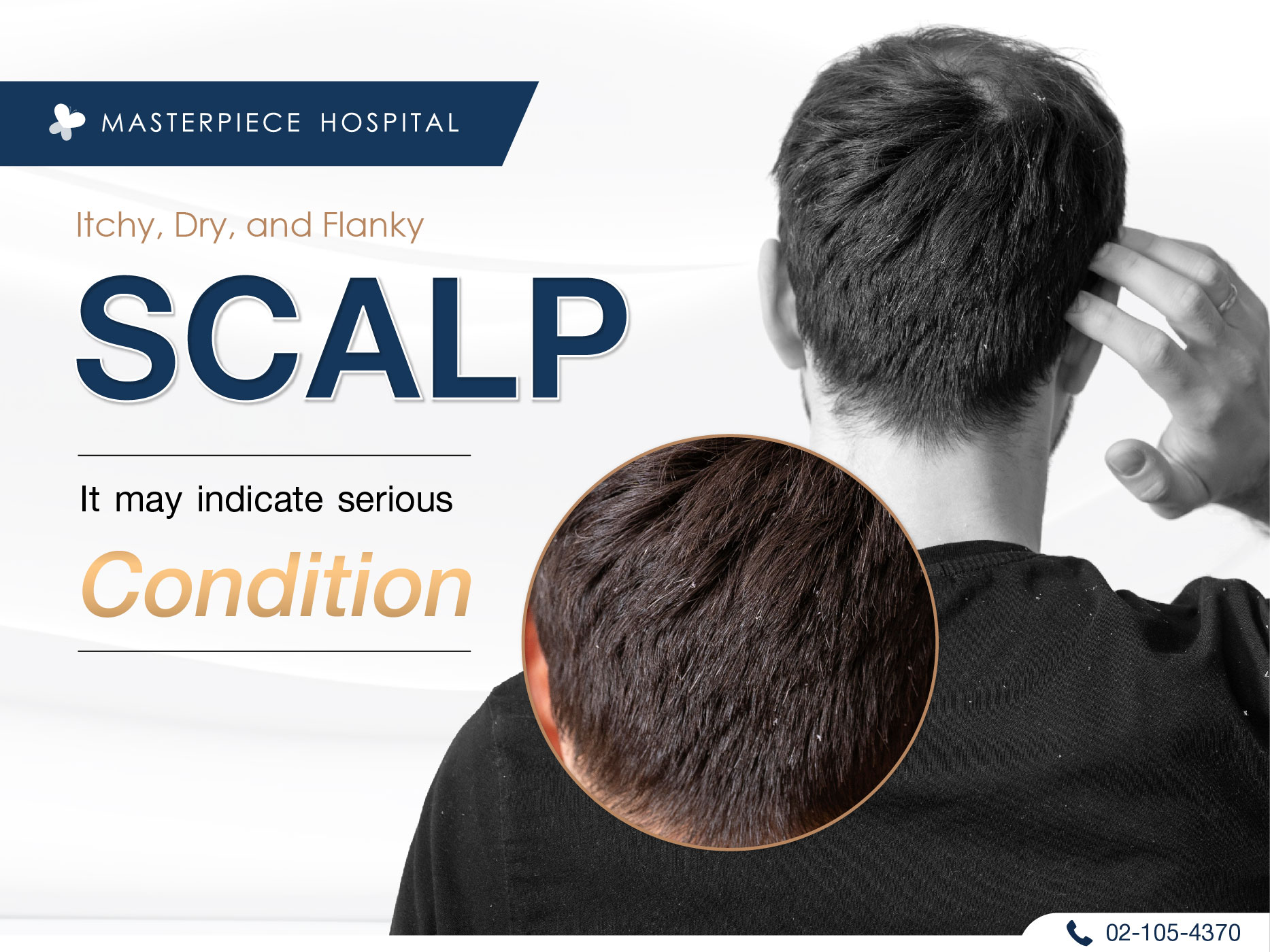Dry, Flaky Scalp May Indicate an Underlying Serious Condition
Dry, Flaky Scalp
If you suddenly notice flakes or peeling patches on your scalp, don’t ignore them. While they might seem like ordinary dandruff, they could be dry, flaky scalp resulting from underlying scalp issues.
This condition can become serious if left untreated. Without proper care, it could develop into more severe medical problems. That’s why we’ve compiled key information in this article to help you understand how to manage a dry, peeling scalp, what causes it, and how to properly care for it, so you can finally put those lingering concerns to rest.
What Is a Dry, Flaky Scalp?
A dry, flaky scalp is often a side effect of underlying skin conditions such as allergies, itching, inflammation, red spots, or white, peeling patches across the scalp. These symptoms are sometimes mistaken for dandruff, leading many to treat them incorrectly.
As a result, patients often wonder how to properly treat a dry scalp and what type of shampoo can help restore their scalp, hair roots, and hair’s natural shine. However, before trying over-the-counter solutions, it’s best to consult directly with a specialist. That’s because these symptoms differ from typical dandruff and generally can’t be effectively treated at home.
A flaky scalp can be caused by various factors, ranging from personal habits to underlying medical conditions. This issue can affect not only physical appearance but also a person’s emotional well-being. To prevent the condition from worsening, I’ll outline the key causes in the next section so patients can better understand the problem and seek proper treatment.
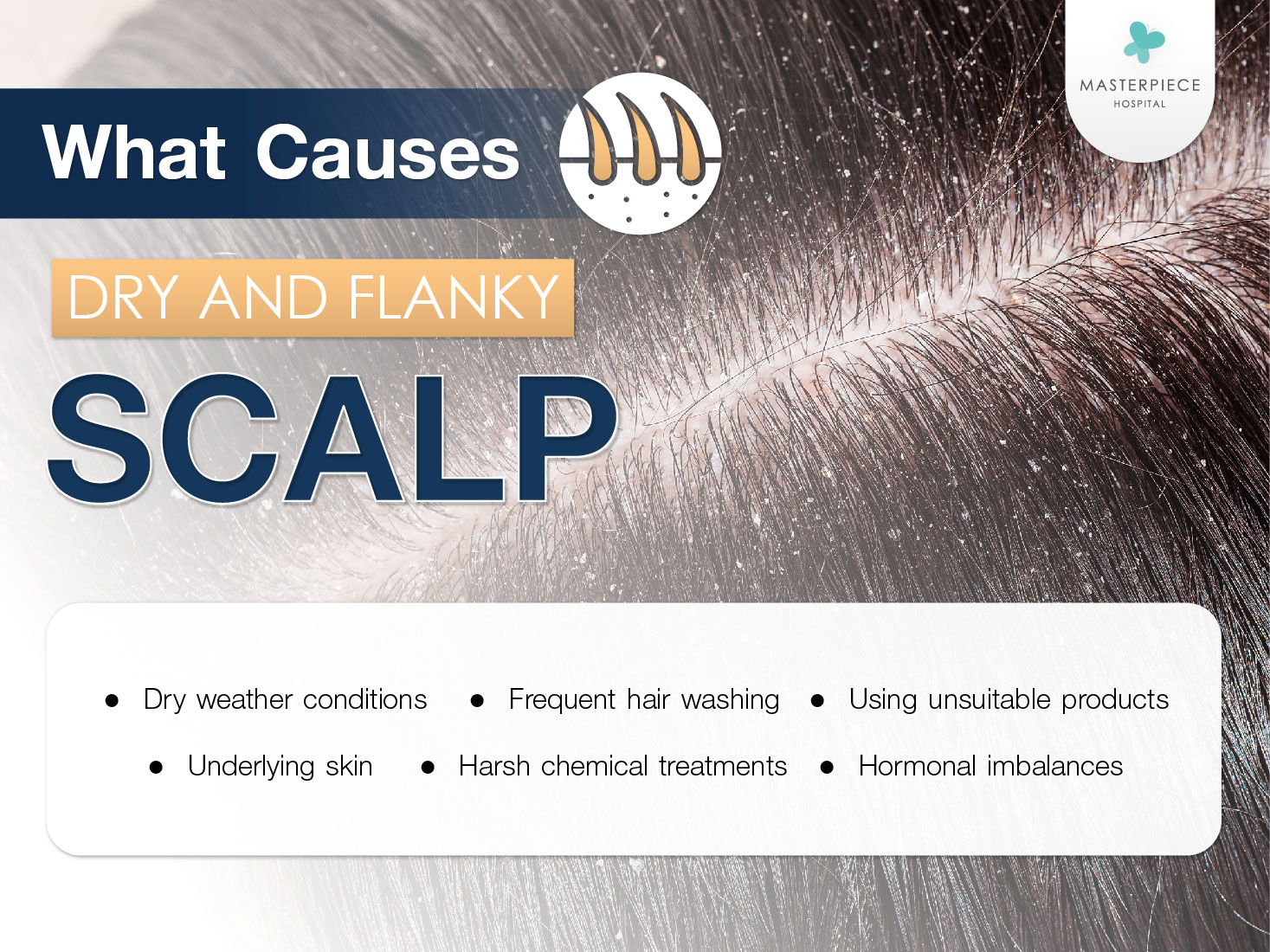
What Causes a Flaky Scalp?
A flaky scalp can result from several factors. Most commonly, it starts with everyday habits that negatively affect hair and scalp health. Ignoring or neglecting these early issues can allow a minor problem to escalate into something much more serious. To help prevent the condition from worsening, here are some common causes to watch out for:
- Dry weather conditions: Prolonged exposure to air conditioning or environments with low humidity and temperature can reduce moisture in the scalp, leading to dryness.
- Frequent hair washing: Washing your hair too often, especially with hot water or shampoos containing harsh chemicals, can strip the scalp of natural oils and lead to dryness.
- Using unsuitable products: Hair products that don’t suit your scalp type can cause irritation or allergic reactions, leading to dry and damaged hair roots.
- Underlying skin conditions: Issues such as psoriasis, anemia, or other dermatological conditions can cause the scalp to become dry, irritated, and flaky.
- Harsh chemical treatments: Hair dyeing, especially when done frequently or with strong chemicals, can severely damage the scalp and cause dryness.
- Hormonal imbalances: Changes in hormone levels, such as during pregnancy or puberty, as well as emotional factors like stress or depression, can disrupt the scalp’s moisture balance and lead to flaking.
These are just a few potential causes of scalp dryness. If you’re experiencing persistent flaking or dryness, it’s best to consult a dermatologist or medical specialist to receive an accurate diagnosis and appropriate treatment.
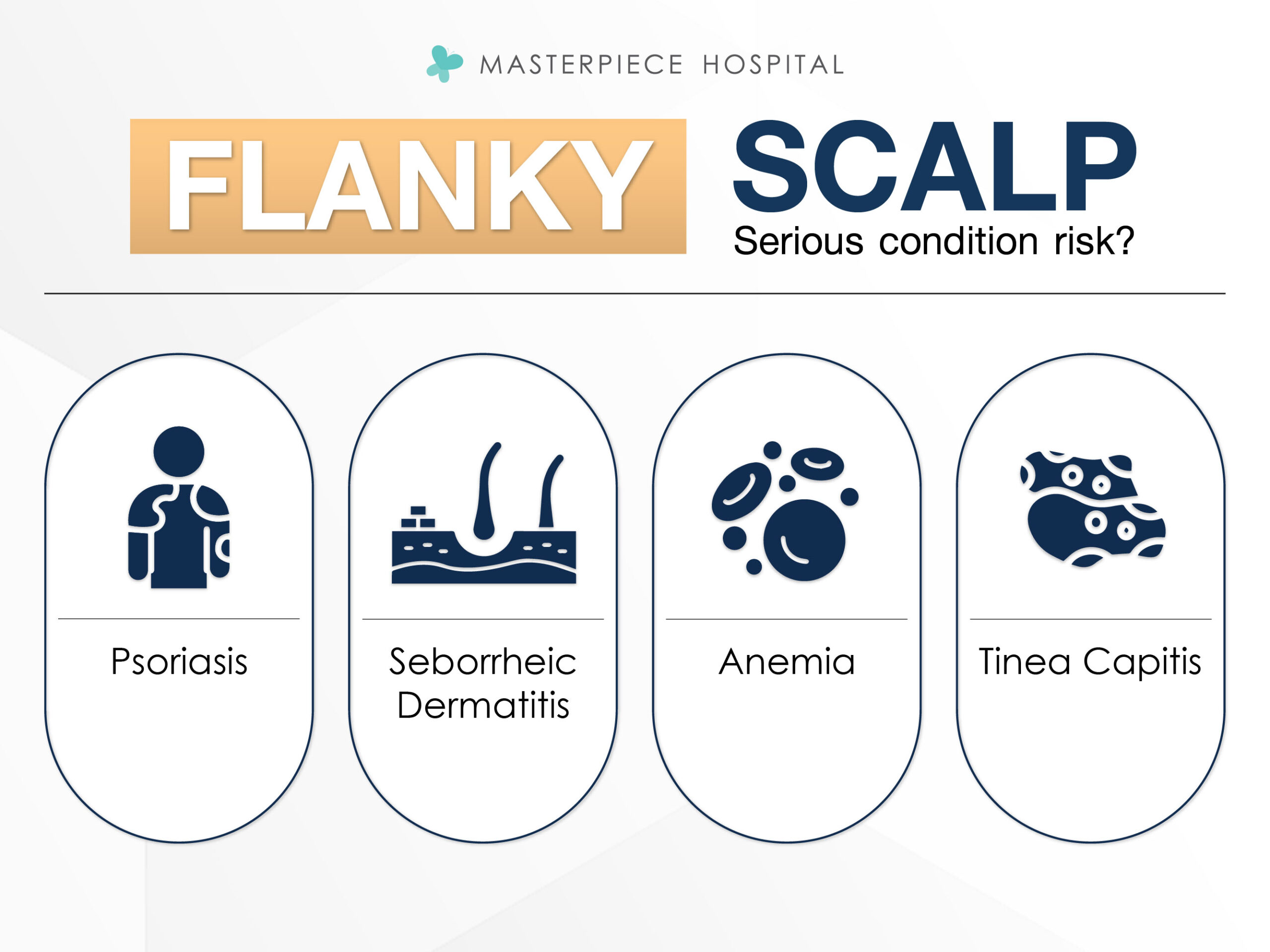
Is a Flaky Scalp a Sign of Disease?
Flaking of the scalp may be an early warning sign of serious underlying conditions that affect both the skin and hormone levels. Below are some potential diseases that can cause dryness and peeling of the scalp:
Psoriasis
This condition is caused by abnormal skin cell turnover that leads to immune system dysfunction. Common symptoms include inflamed skin and silvery white flakes. While psoriasis isn’t curable, it can be managed to reduce flare-ups and prevent the condition from worsening.
Seborrheic Dermatitis
This chronic condition occurs due to inflammation of the sebaceous glands in the skin. It’s often triggered by hormonal changes, yeast or fungal infections, genetic factors, and environmental conditions. Though it can’t be cured, treatment can help control symptoms. The condition often affects quality of life and self-confidence.
Anemia
Anemia happens when the body has fewer red blood cells than normal, leading to reduced oxygen delivery throughout the body. Symptoms include fatigue, weakness, and lightheadedness. Though not considered life-threatening, anemia can interfere with hair growth and may make hair transplantation more difficult.
Scalp Ringworm (Tinea Capitis)
This fungal infection can arise from poor hygiene, inappropriate hair products, or a lack of scalp care. Many confuse it with dandruff, but unlike dandruff, it can cause hair loss, itching, and scab-like lesions. Early consultation with a specialist is crucial to avoid complications.
Each of these conditions requires time and consistent care to manage properly. If left untreated, they can lead to visible scars or emotional distress. However, there’s no need to worry—consulting a hair restoration specialist can help restore your confidence and support you in achieving a healthier scalp and stronger hair.
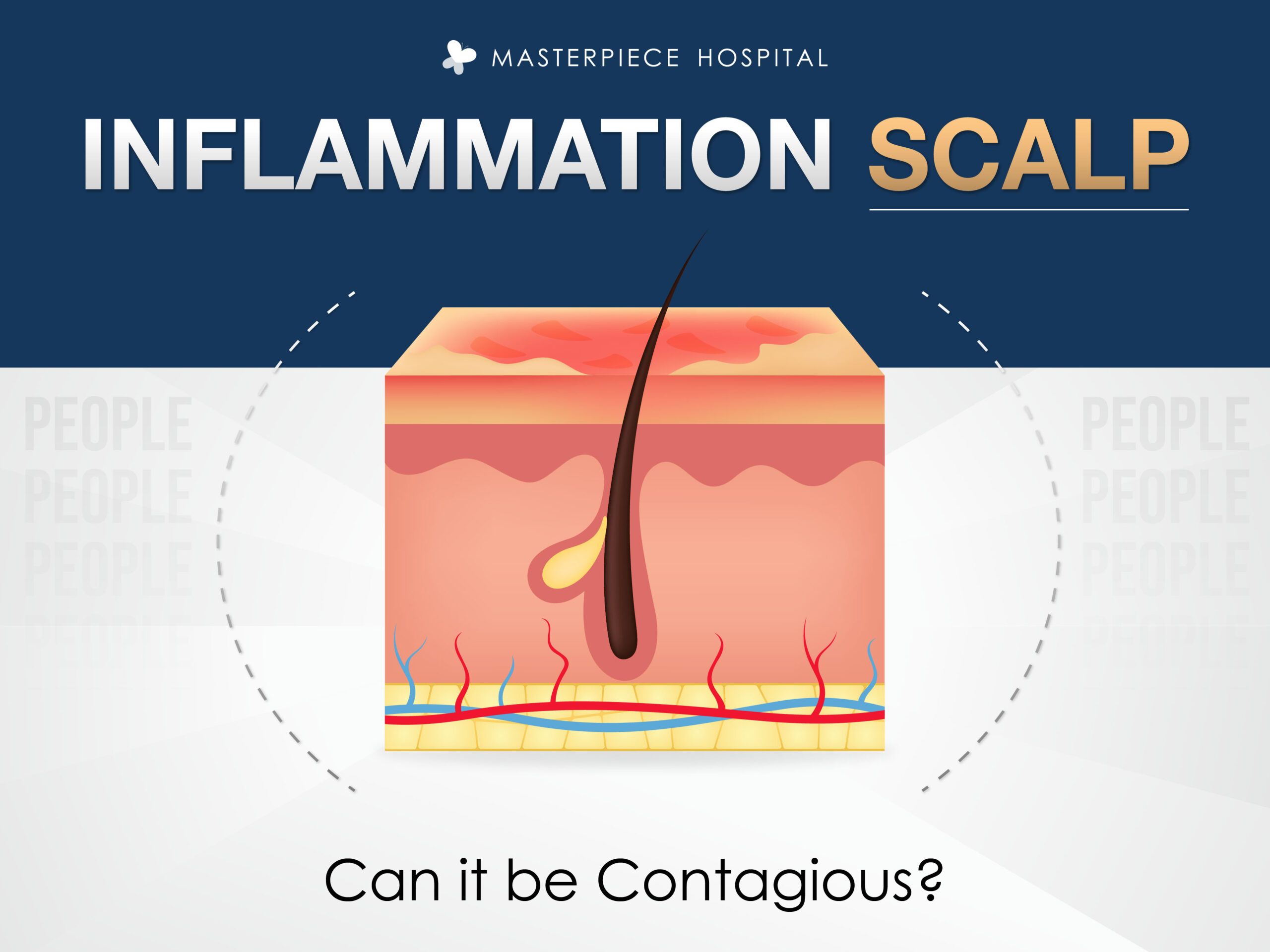
Can Scalp Inflammation Be Contagious?
Many people worry whether scalp inflammation is contagious. Let me clarify and emphasize in this article that it’s not contagious, even if the scalp is wounded, swollen, or red. These symptoms usually stem from individual factors such as dry skin, fungal infections, underlying health conditions, or personal lifestyle habits.
In summary, scalp inflammation cannot be transmitted to others, even through direct contact. However, if you notice signs of inflammation on your scalp, it’s best to consult a specialist as soon as possible. This ensures proper diagnosis and treatment to help restore your scalp to its healthy condition.
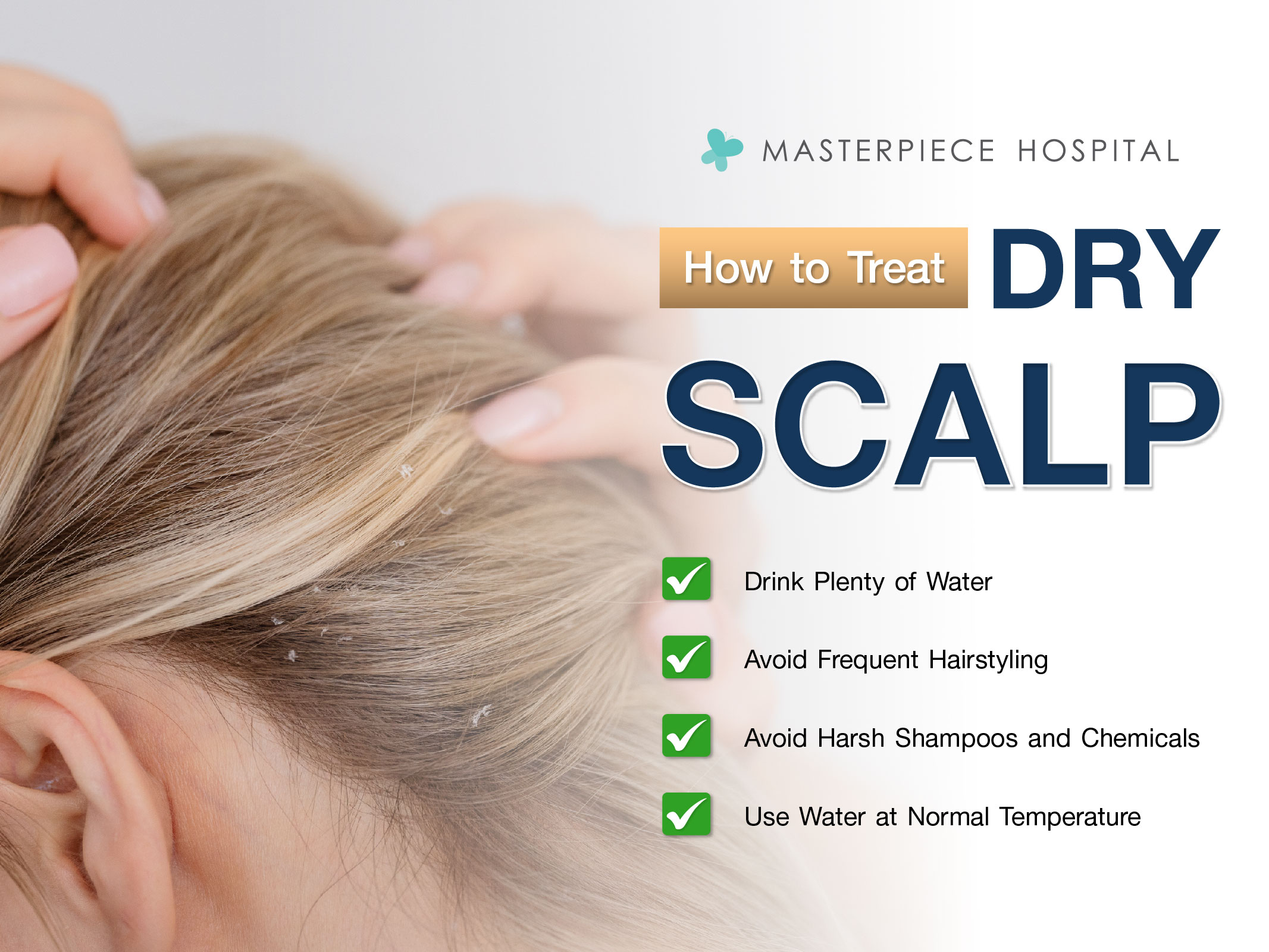
How to Treat Dry Scalp
For those experiencing dry scalp and unsure how to treat it, here are some effective techniques to help restore your scalp to a healthy state:
- Drink Plenty of Water
Staying hydrated is one of the best ways to treat a dry scalp. Drinking enough water helps maintain moisture levels throughout the body, including the scalp, preventing dryness and flaking.
- Avoid Frequent Hairstyling
Regular use of styling tools like hairdryers, flat irons, and curling wands, as well as product build-up from gels or sprays, can lead to scalp dryness. Reducing how often you style your hair can help maintain scalp health.
- Avoid Harsh Shampoos and Chemicals
Many shampoos contain strong chemicals like sulfates, silicones, or alcohol, which can irritate the scalp and strip away natural moisture. Opt for shampoos with natural ingredients such as aloe vera, kaffir lime, coconut oil, or olive oil. These are gentler on the scalp and help nourish and strengthen it.
- Use Water at Normal Temperature
Washing your hair with lukewarm or room temperature water helps retain moisture better than hot water, which can dry out your scalp and worsen the condition.
Following these steps can significantly improve scalp hydration and reduce dryness. If the condition persists, consulting a dermatologist is highly recommended for a tailored treatment plan.
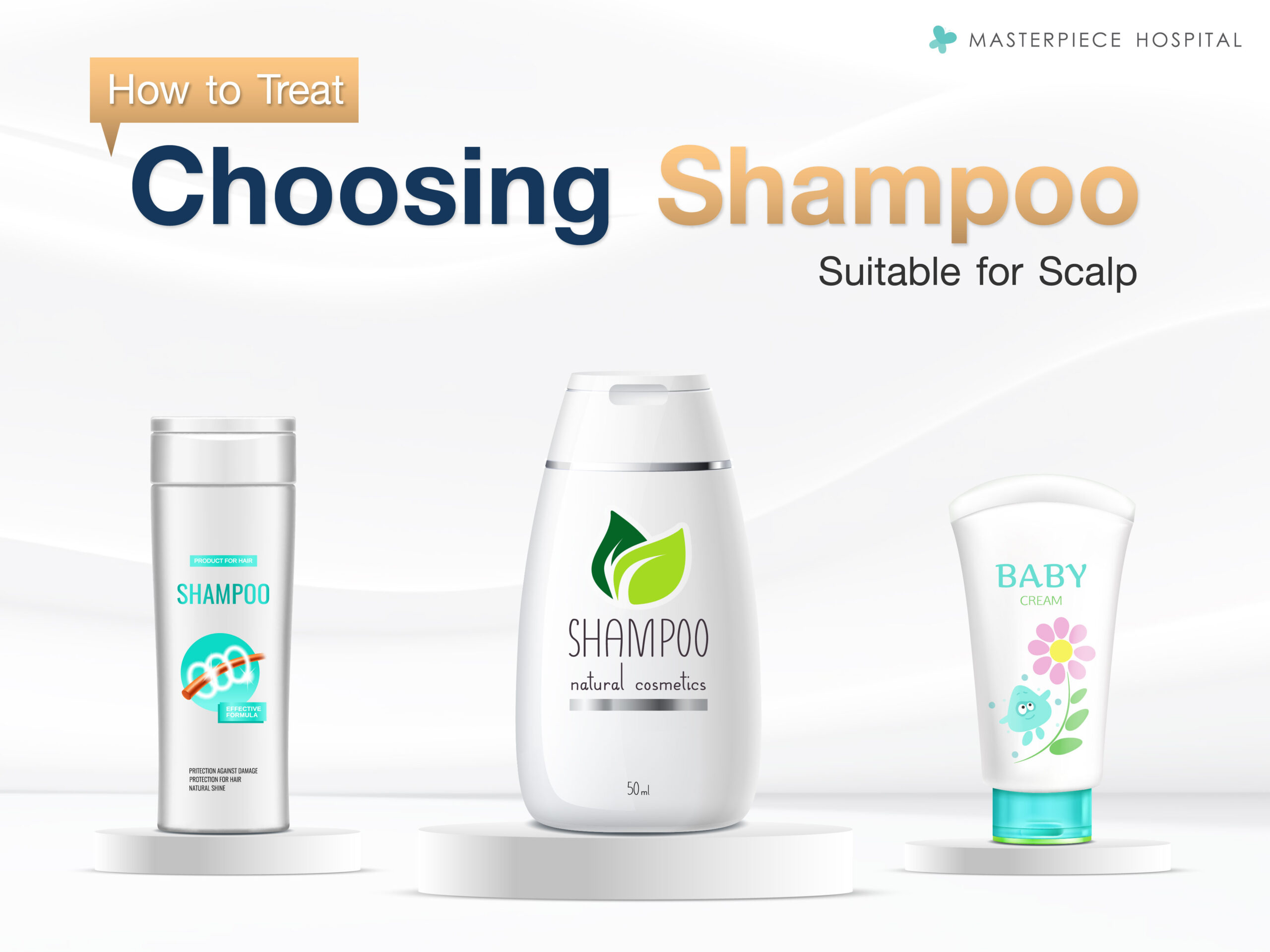
Technique for Choosing Shampoo Suitable for the Scalp
Having soft or naturally shiny hair is probably something many young people desire because it shows special care for hair health, attention to small details, and it also adds charm and confidence in daily life.
Nowadays, many factors can affect hair or scalp, such as air pollution or choosing shampoos that are not suitable for the scalp, which can cause dry, damaged hair and hair loss. To reduce scalp-related problems, today I have some tips for choosing shampoo as follows:
Shampoo for adults
Should avoid using shampoos that produce too much foam betheyuse it may cause split ends, lack of volume, and lifeless hair. Patients should choose shampoos containing conditioning agents to strengthen hair health and make it naturally shiny.
Shampoo for children
Patients should choose shampoos that are gentle to children’s skin because children have delicate scalps.
Shampoo for dry hair
Recommended to use shampoos containing oils to help add moisture to the hair and nourish the scalp more deeply. However, patients should not wash their hair every day because it may cause loss of natural oils produced by the body. Also, patients should avoid using hot or warm water because it can make hair brittle and drier.
Shampoo for oily hair
Some patients may experience oily hair, hair loss, dandruff, and an itchy scalp. It is recommended to use shampoos containing natural ingredients because they can help control oiliness on the scalp.
Shampoo for hair growth
Shampoos suitable for hair growth have many restrictions because some people may experience allergies, red rashes, or itching. Therefore, I recommend shampoo products from Masterpiece Hospital because they have been reformulated and widely accepted. They have comprehensive benefits in one bottle, such as being gentle to the scalp, balancing the scalp, deeply cleansing, reducing hair loss, and being free from silicone and parabens.
However, patients should consult a doctor to examine the skin condition to determine which treatment is more appropriate. Some may be more suitable for hair transplant surgery first, then use shampoos or serums provided by the hospital for further hair care.
